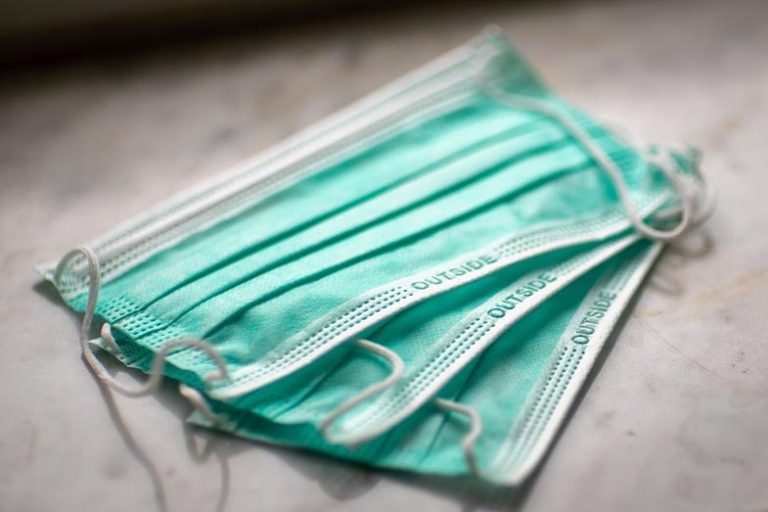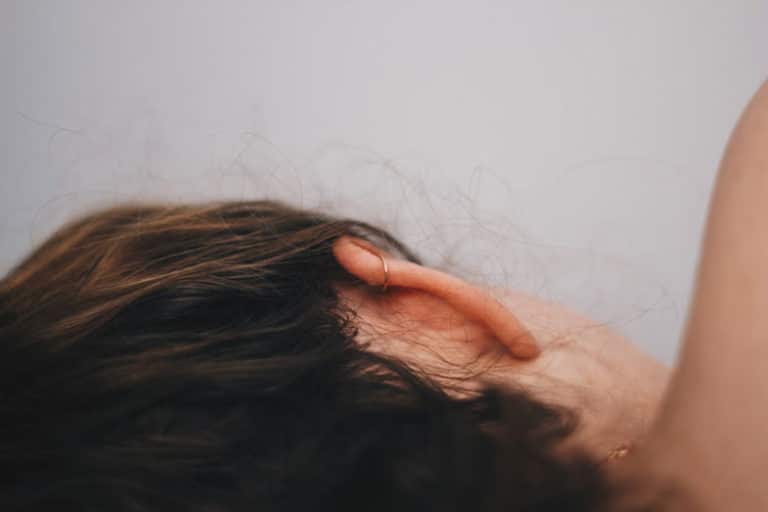What Are the Risks of Sleeping on Damp Bed Sheets?
Disclosure: We may get commissions for purchases made through links in this post.
Sleep is one of the most fundamental requirements for holistic health and well being. Many, however, struggle to obtain a sufficient amount. One of the most common impediments to deep sleep is high temperatures.
In a bid to regulate room temperature, people have tried many techniques, one of which is to sleep on damp sheets. But just how healthy or safe is this practice? What are the risks of sleeping on damp bed sheets?
- Damp bed sheets can be a breeding ground for bacteria and germs.
- The dampness may attract insects such as fish moths.
- Damp sheets may ruin your mattress and cause a bad smell.
- Your skin may feel soggy and be vulnerable to infection.
- Cold-related health problems may arise.
Sleeping on damp bed sheets is generally uncomfortable, but many people prefer to do so, especially in places with warmer climates.
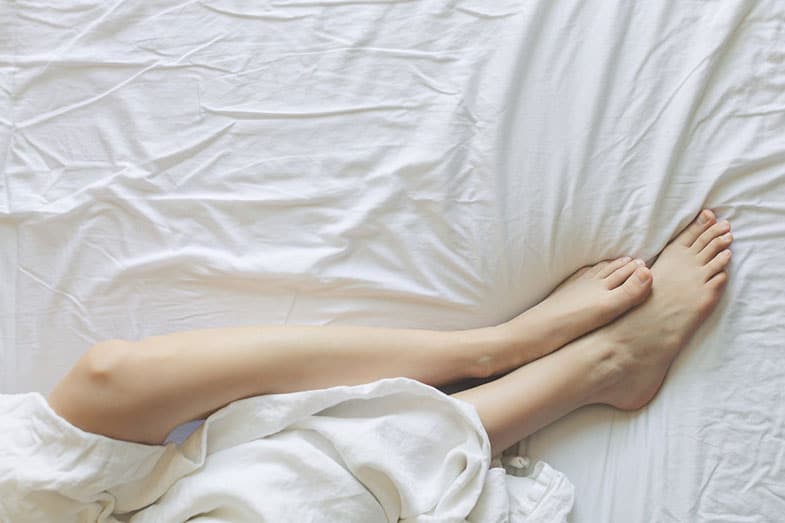
There are many risks involved, but why do people choose to sleep on damp or wet bed sheets? Keep reading to find out.
Also, take a look at these popular Amazon products that are excellent for those who sleep on damp bed sheets, or generally prefer a cooler environment to sleep in.
| SafeRest Waterproof Mattress Protector (view on Amazon) |
Pro Breeze Electric Mini Dehumidifier (view on Amazon) |
| The SafeRest mattress protector is hypoallergenic, and waterproof, making it an ideal addition to your mattress. It is made of cotton, and will not change the feel of your mattress. | The Pro Breeze dehumidifier is a great addition to your bedroom. It is compact and lightweight, portable, and ultra-quiet. |
Why Would You Prefer to Sleep on Damp Sheets?

One reason why some people resort to sleeping on damp sheets is for the cooling effects, especially during extremely high temperatures in the Summer. When temperatures are abnormally high, it may be difficult to get good-quality sleep, since sweating may keep you awake.
Sweating distracts your sleep in two ways:
First, the general feeling of dampness causes the sheets to irritate your skin, thereby interrupting your sleep. Secondly, we lose a lot of water as a result of sweating. Your brain will send signals to the sensory receptors that deal with dehydration, thereby making you wake up to quench your thirst. It is acceptable when your sleep is interrupted by phenomena such as bowel or bladder movements, as these we cannot help. However, the case is quite different from dehydration, as this is something we have control over.
Another reason some people opt to dampen their sheets before going to sleep is that damp sheets are wrinkle-free. Dampness on your sheets mends all creases and causes them to remain in their smooth texture up to the following morning. Even though this is pleasing to the eye, it may be worse for your health.
People that dampen their sheets believe that in doing so, the cold water that is absorbed in them will evaporate. In the process, the resultant vapor will combine with the heated atmosphere, causing their bodies to cool down. However, sleeping on damp sheets has its drawbacks, and may lead to serious consequences.
The Risks of Sleeping on Damp Bed Sheets

Though it may feel quite soothing to first climb into fresh, cool sheets, the feeling will eventually become uncomfortable. Sleeping on a damp bed includes the following risks.
1. Germs
Damp surfaces are breeding grounds for bacteria, fungi, germs, and other disease-causing microorganisms. A common one is mold fungi. Mold fungi will affect you in two possible ways. First, it will stain your sheets. Not only does this mark their aesthetic appeal, but it may also cause problems when washing them. On a more serious note, mold fungi can cause a wide spectrum of allergic reactions, ranging from mild skin rashes and coughs to severe sore throats.
2. Insects
Some types of insects are attracted to moisture. For example, fish moths. Though most of these insects are not dangerous, some could be carriers of vector-borne diseases. Even those that do not transmit any diseases could still cause a bit of disturbance at night. The buzzing sound might interfere with your sleep. Some might attack sensitive areas of your body such as the eyes, nostrils, ears or mouth, and inflict bites or cause severe discomfort.
3. Bad smell
Damp sheets can sometimes smell pretty bad. The musty smell resulting from the dampness of your sheets is undoubtedly unpleasant. It may also get worse once they mix with the detergent used to wash the sheets.
4. Cold-related health conditions
The dampness, apart from reacting adversely with your skin, could also create a wide range of respiratory infections such as asthma, pneumonia and chronic red eyes. Some of these diseases are debilitating, and if they go without urgent medical intervention, it could result in severe consequences.
How to Keep Moisture out of the Mattress?
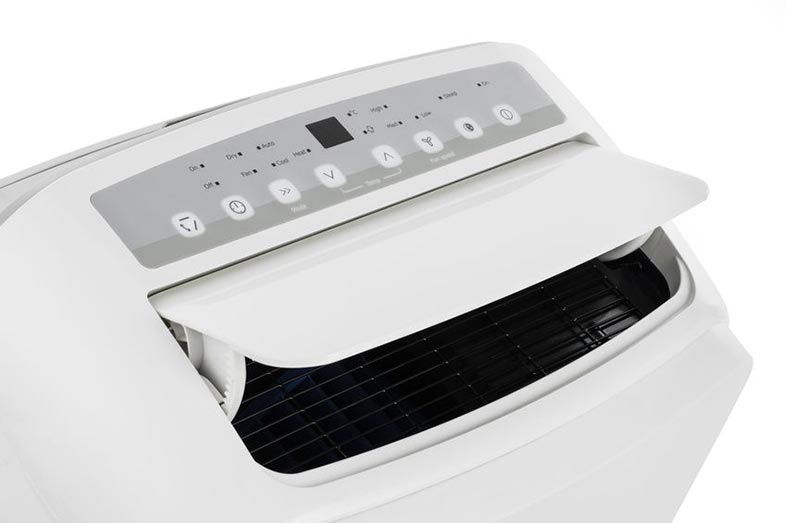
- Use a waterproof mattress protector – This is perhaps an ideal way of keeping moisture from your mattress. Certain mattress protector materials, such as oilcloth have waterproof capabilities. A waterproof mattress protector can also protect against dust mites and allergens. However, if your mattress protector is not waterproof enough, make it a high priority to keep moisture away from the bed.
- Use a dehumidifier – Normal indoor humidity is something between 30 and 60 percent. If the humidity goes beyond 60 percent, you should get a dehumidifier. By riding your indoor atmosphere of excessive moisture, these devices also seamlessly inhibit the growth of disease-causing microorganisms.
- Invest in indoor plants – It is possible to create a symbiotic relationship with individual indoor plants. You nourish these plants with their basic requirements such as water, mineral salts, and lighting, while they repay by absorbing moisture from the atmosphere. Some of the best indoor plants recommended for humidity reduction include Xerophytes and Epiphytes. However, there are some dangers associated with indoor plants. When choosing indoor plants, ensure you go for those that do not cause skin sensitivities. Also, ensure there are only a few in your bedroom so as not to be deprived of oxygen at night.
- Dry sheets properly – You probably don’t need to be reminded of the importance of drying your clothes and sheets correctly. You shouldn’t have problems with sunny or windy days. However, on more humid months, you may invest in a machine drier to remove all dampness before making the bed.
- Properly treat your AC filters – During high humid conditions, your AC usually is overworking. To ensure it effectively regulates indoor humidity in your bedroom, clean the filters thoroughly. Better yet, you can have the system regularly inspected, especially at the onset of more humid weather.
How to Dry a Damp Bed
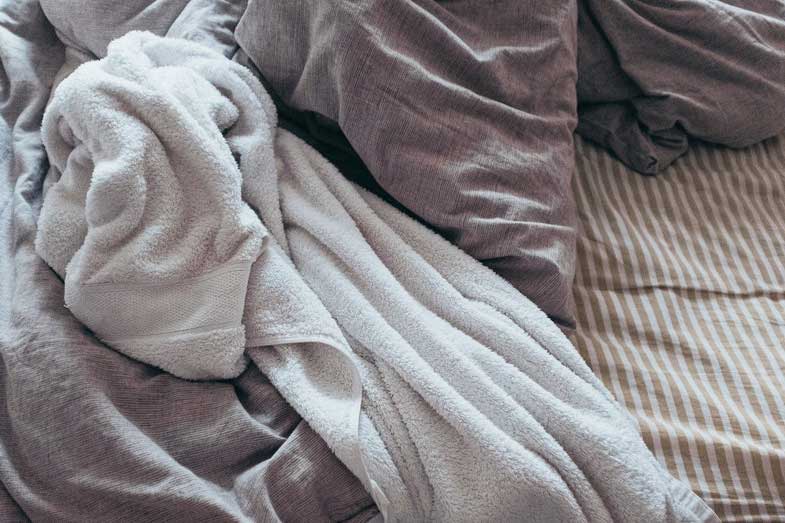
- Use dry towels to soak up the liquid – This should be done before any spill dries off. This way, you absorb much of the liquid before it drains deeper into the mattress. Try to blot as much liquid as you can, replacing the towel each time it gets heavy and wet.
- Use a hairdryer to blow dry wet areas – This works wonders if only one area of the mattress is wet. Set the hair dryer to warm” and then gently move it over the damp area.
- Use direct sunlight – After soaking up as much liquid as you can, take your mattress outdoors and place it in direct sunlight. Turn it at intervals to get all the sides to dry up.
- Aerate your room – If the mattress is only damp, you can get the dampness out by opening windows to allow air to move around. For maximum effects, focus a fan or a dehumidifier around the dampest spots of the mattress.
Even though these methods should help to remove moisture from the mattress, aim to prevent it from happening in the first place. That’s why you will need to waterproof your mattress, incorporate indoor plants, among other techniques that have been highlighted in the previous section.
Alternatives to Dampening Your Bed Sheets
There are alternative methods other than dampening your sheets if you like the feeling of sleeping on fresh, crisp sheets. Here are some ways on how to cool down a room.
- Use air conditioning – Air conditioning is the easiest way to combat sweating in the night, and one of the best ways to cool off your room quickly, efficiently, and reduce the adverse effects on your health when dampening your sheets.
- Install blackout curtains for your windows – Another reason you might feel hot in your bedroom is from the sunlight coming in through the windows. This could be solved by blackout curtains that will block the UV rays from getting inside your room.
- Use cotton sheets on your bed – The most comfortable and breathable fabric you could use for your bed sheets is high-quality linen, bamboo, or cotton. Consider a lower and thinner thread count that is lightweight to the touch. Sweaty sleepers will be thankful at how comfortable they feel.
- Wear lightweight and breathable clothes – Lightweight cotton clothes will keep you fresh and cool throughout the night. Have a dedicated pair that you use for sleep, and avoid using your outside clothes in bed.
What Causes the Feeling of Wetness on Cold Sheets?
One explanation to this is that when you get tucked into cold sheets in a generally warm room, there will be lots of air exchange. After a short while, the warm air will react with cold air, possibly causing bits of condensation on your sheets. The resultant water is what causes the feeling of wetness.
But the most credible reason why cold sheets may appear wet is that our bodies do not have receptors which sense wetness. Apart from our body lacking these crucial receptors, another thing that feeds this feeling is the fact that we associate wetness with coldness. The feeling of coldness, coupled with the pressure caused by the sheets, give a generalized feeling of wetness.
Conclusion – What Are the Risks of Sleeping on Damp Bed Sheets?
Sleeping on damp bed sheets can feel nice, especially during those hot, summer nights, however, consider the risks involved with doing so. It can feel great to jump into damp sheets initially, but during the night, when the temperature drops, you may actually feel cold. Other problems may arise such as germs and insects.
If you dampen your bed sheets, be prepared for possible mold or other related problems. Seek out alternative methods to keep cool during the night.

